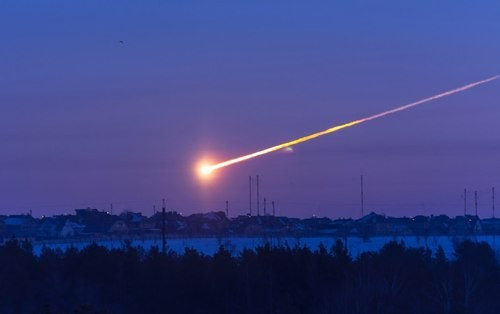Nuclear Bomb or Killer Asteroid: Which Would Kill Us All First?

You would think a nuclear bomb would be most likely to cause mass devastation, but scientists researching asteroid-warning systems are saying the impact from an asteroid hitting the earth would be 150,000 times more powerful than an atomic bomb.
Almost 1,200 people were injured and £21.3m of damage was caused to hundreds of buildings when a meteorite hit Chelyabinsk, Russia in February 2013.
The nuclear bomb dropped on Hiroshima on 6 August 1945 released an estimated 15 kilotons of energy. The Chelyabinsk meteorite fireball, in contrast, was equivalent to a 500-kiloton explosion and scientists feel that this is a wake-up call that something needs to be done to prevent further disasters.
"A couple of years ago, I had to use the dinosaur example to justify our research. Now, that's no more - we had this major event," Iowa State University researcher Bong Wie told the audience at the 2014 Nasa Innovative Advanced Concepts (NIAC) meeting at Stanford University on 6 February, according to Live Science.
Is it believed that dinosaurs became extinct after an asteroid hit earth over 65 million years ago.
Wie and his team think that nuclear bombs could be used to explode asteroids.
They are now working to develop a concept spacecraft called the Hypervelocity Asteroid Intercept Vehicle (HAIV) that would meet the asteroid in space and blast a large crater in the middle of the it using a kinetic impactor.
A nuclear bomb would follow closely behind the HAIV and would detonate inside the crater that the HAIV had just made, blowing the asteroid into smaller meteorite pieces that would pose much less of a risk to earth than an asteroid.
According to Wie, if we had 30 days' warning that a 1,000 foot-wide asteroid was headed towards earth and used the kinetic impactor to punch a crater into the asteroid, the ability of the nuclear bomb to destruct the asteroid will be increased by a factor of 20 and less than 0.1% of the object's mass would strike the earth.
Meteorite shower instead of certain death
While fragments of the asteroid might still shower down as meteorites, the effects of the impact would be minimal.
"We would have a heavy meteor shower, or maybe 100 Chelyabinsk meteor events," Wie said.
Wie thinks that the HAIV system, which will cost $500m (£298m), should be used together with an asteroid-warning system such as the Asteroid Terrestrial-impact Last Alert System (ATLAS), which is currently being built by the University of Hawaii with $5m of funding from Nasa.
Once ATLAS is fully operational in 2015, the alert system will be able to give us one-day warnings for 26-foot wide asteroids, a one-week alert for 148 feet asteroids and a three week warning period for a 459-foot asteroid.
So will a nuclear bomb be the end of us first, or will an asteroid beat a third world war to the chase? Guess we'll have to wait and see.
© Copyright IBTimes 2025. All rights reserved.






















